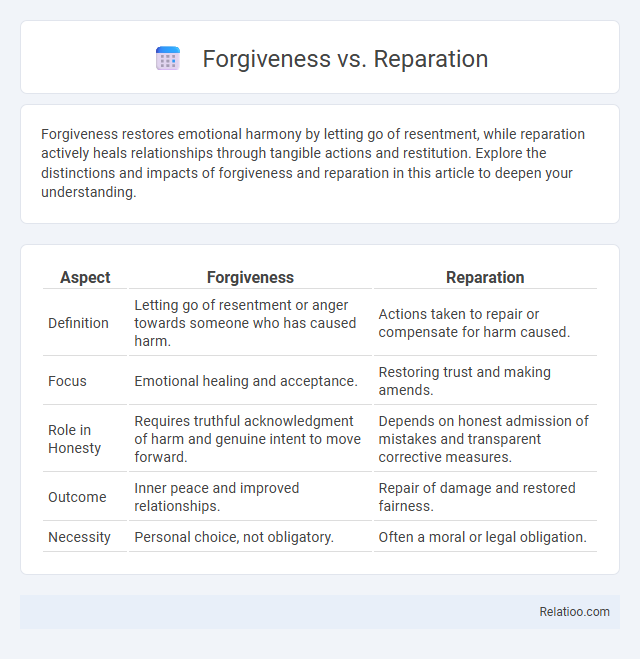Forgiveness restores emotional harmony by letting go of resentment, while reparation actively heals relationships through tangible actions and restitution. Explore the distinctions and impacts of forgiveness and reparation in this article to deepen your understanding.
Table of Comparison
| Aspect | Forgiveness | Reparation |
|---|---|---|
| Definition | Letting go of resentment or anger towards someone who has caused harm. | Actions taken to repair or compensate for harm caused. |
| Focus | Emotional healing and acceptance. | Restoring trust and making amends. |
| Role in Honesty | Requires truthful acknowledgment of harm and genuine intent to move forward. | Depends on honest admission of mistakes and transparent corrective measures. |
| Outcome | Inner peace and improved relationships. | Repair of damage and restored fairness. |
| Necessity | Personal choice, not obligatory. | Often a moral or legal obligation. |
Understanding Forgiveness: Definition and Scope
Forgiveness is the intentional process of releasing feelings of resentment or vengeance toward a person or group who has caused harm, without necessarily condoning the offense. It encompasses emotional healing and mental peace, distinct from reparation, which involves actions or compensation to make amends for wrongdoing. Understanding forgiveness requires recognizing its role in personal well-being and relational restoration, rather than as a substitute for justice or restitution.
What Is Reparation? Legal and Moral Perspectives
Reparation involves compensating for harm or injury caused, often through monetary payment, restitution, or restorative actions, addressing both legal and moral obligations. Legally, reparation is enforced through court orders or settlements to rectify damages, while morally it emphasizes accountability, healing, and restoring relationships between parties. Unlike forgiveness, which is an emotional release of resentment, reparation actively seeks to repair the consequences of wrongdoing and provide tangible redress.
Historical Contexts: Forgiveness and Reparation in Society
Forgiveness in historical contexts often serves as a personal or collective process aimed at healing emotional wounds without necessarily addressing material losses, whereas reparation involves tangible compensation or restitution for injustices committed. Societies faced with systemic wrongs, such as colonialism or slavery, frequently debate the balance between symbolic forgiveness and concrete reparative actions to achieve justice and reconciliation. Your understanding of these concepts can deepen societal awareness and promote meaningful dialogue about addressing historical grievances effectively.
Key Differences Between Forgiveness and Reparation
Forgiveness involves your personal decision to let go of resentment toward someone who caused harm, focusing on emotional healing and release. Reparation requires the responsible party to make amends through tangible actions such as compensation or restitution to address the damage done. While forgiveness is an internal, voluntary process, reparation is an external, often formal obligation aimed at restoring justice and repairing relationships.
Psychological Impacts: Healing Through Forgiveness vs. Reparation
Healing through forgiveness fosters emotional release and reduces stress, allowing you to reclaim peace and promote mental well-being. Reparation, on the other hand, involves tangible acts to restore trust and repair relationships, which can help rebuild self-esteem and create a sense of justice. Both processes contribute uniquely to psychological healing, with forgiveness addressing internal emotional wounds and reparation focusing on external relational restoration.
Religious and Cultural Views on Forgiveness and Reparation
Religious and cultural views on forgiveness and reparation emphasize the importance of healing and justice in restoring relationships and communities. Forgiveness is often seen as a divine or moral act of letting go of resentment, found in Christianity, Islam, Buddhism, and Hinduism, while reparation involves making amends or compensating for harm, highlighted in Jewish and Indigenous traditions. Your understanding of these concepts can guide personal growth and communal harmony by balancing mercy with accountability.
Case Studies: Real-World Examples of Forgiveness and Reparation
Case studies from South Africa's Truth and Reconciliation Commission illustrate forgiveness as a tool for healing societal wounds, enabling victims to provide amnesty to perpetrators in exchange for truthful testimony. In contrast, post-genocide Rwanda exemplifies reparation through government programs offering compensation and community rebuilding to survivors to restore dignity and economic stability. Northern Ireland's peace process blends forgiveness and reparations, combining truth recovery with material support to foster long-term reconciliation after decades of conflict.
The Role of Justice in Forgiveness and Reparation
Justice plays a crucial role in forgiveness and reparation by ensuring accountability and acknowledging harm, which facilitates genuine healing and restoration. Your path to forgiveness often requires recognition of wrongdoing through fair and transparent reparative measures that address victims' needs and promote social equity. Effective justice mechanisms bridge the gap between emotional reconciliation and tangible restitution, reinforcing trust in restorative processes.
Benefits and Limitations of Forgiveness and Reparation
Forgiveness promotes emotional healing and reduces stress by allowing individuals to release resentment, yet it may not address the material or systemic wrongs experienced. Reparation focuses on compensating victims through tangible measures like financial restitution or policy changes, offering a sense of justice and restitution but sometimes failing to provide emotional closure. While forgiveness fosters personal peace, reparation emphasizes accountability and tangible redress, each with inherent limitations in fully resolving harm.
Choosing the Path: When to Prioritize Forgiveness or Reparation
Choosing when to prioritize forgiveness or reparation depends on the nature and impact of the harm experienced. Forgiveness involves letting go of resentment to restore emotional balance, while reparation requires tangible actions to address and amend the damage done. Your decision should align with the goals of healing, accountability, and restoring trust in relationships.

Infographic: Forgiveness vs Reparation
 relatioo.com
relatioo.com